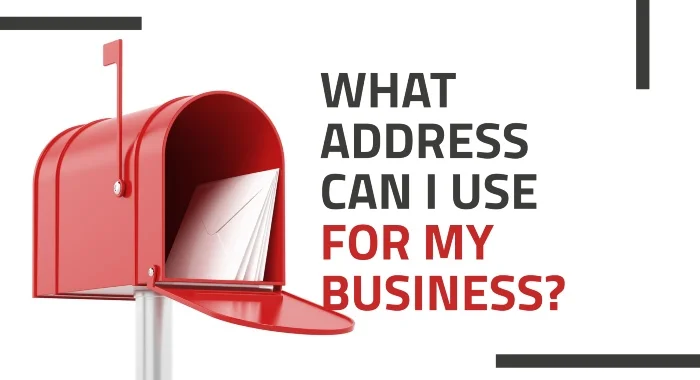Setting up a new business is an exciting opportunity. But one of the first hurdles that you’ll encounter comes from the formality of literally setting up your business.
Once you’ve decided on the type of company structure that you want to set up, you’ll need to supply some extra details such as a business address to make it all official.
That may seem simple enough, but if you’re currently running your business from your home, you may not want this information to be in the public domain.
What’s more, there are different types of company addresses that you can supply, including a registered office, service and business address.
If you’re wondering what address can I use for my business, look no further. This guide will answer all the questions you’ll have, highlight the difference between these address types and get you ready to set up your own business.
Let’s get started…
How to choose a business address
A business address must be somewhere in the UK where you can receive official communications. It’s also used in a variety of circumstances, such as:
- Opening a business bank account or merchant account
- Registering your business domain name
- Opening accounts with vendors and suppliers
- Receiving bills, payments, invoices, and statements
- Filing for legal contracts, permits, and licences
- Communicating with your customers
- Getting your business listed on online sites or directories, such as Google Places, Bing Places, Yelp, Yellow Pages, CheckATrade, etc.
In most cases, a business address is where you physically operate your business from, but that doesn’t necessarily have to be the case.
For example, if you work from home, you can set up your home address as your business address, and you will be able to receive official communications there. If you plan on being a sole trader, this information won’t be publicly available, making it a simple and convenient option.
However, there are also different types of business addresses that you will have to use as a limited company or LLP. These addresses will be displayed publicly, which means that using your home address may not be the best option – particularly if you want to protect your privacy.
Starting A UK Business?
Get rid of the confusion and always know what to do next with Startup Hive, the step-by-step platform created by the Business4Beginners team.
- FREE Step-By-Step Platform
- FREE Bank Account
- FREE Bookkeeping Software
- FREE Email Platform
- FREE Domain Name
- Discounted Company Formation
- Plus Much, Much More!

Join today for 100% FREE access to the entire Plan & Establish phases, taking you from validating your business idea through to setting it up, getting your accounts sorted, and creating a website.
“Excellent guide to build your business”
“The perfect starting point”
“Incredibly simple and intuitive to use”
Startup Hive is your trusted companion as you look to turn all of your business dreams into reality. Join today for free.
—
The three different types of business addresses
There are three types of business addresses that your company may have to use, depending on its circumstances.
Firstly, there’s the Business Address. This is the address where all general business mail will be received, such as communication from banks, suppliers and customers. It’s not needed to set up a limited company or LLP, won’t be available to the public record at Companies House and isn’t a legal requirement to list on websites or stationary.
Secondly, you have a Registered Office address. This is the address of your business that is registered with Companies House. It will be used for government bodies to send communications to, such as HMRC.
This address will be publicly displayed on record at Companies House and must be legally shown on your website and stationary.
Finally, there’s a Service Address. This is the address of a company officer (a director, company secretary or shareholder) designated to receive government mail, such as communications from Companies House or HMRC.
Like your registered office, this will be publicly displayed on record at Companies House and must be legally shown on your website and stationary.
If you want to set up a limited company or LLP, you will need a Registered Office or Service Address. And as these addresses will be publicly available, it means you will have to make sure that you’ve thought clearly about which address you are going to use.
The top 3 options for choosing a business address
By law, your Registered Office must be:
- An active and physical address
- In the country your business is registered in, i.e. England, Wales, Scotland or Northern Ireland
You also can’t use a P.O. Box address as your business address. This is because P.O. Box addresses are storage boxes that you keep inside of a Post Office, which store your mail until you are available to collect.
Although they can be a good idea to help sort out incoming mail, because they are not a physical, active location, they cannot be used for your business address.
That’s because, in theory, P.O. Boxes can be left unchecked for weeks or months, so your Registered Office needs to be somewhere that will be checked more actively for important and official communication.
With that in mind, you have 3 top choices to answer our question of what address can I use for my business address.
Recommended Address Service:
If you’re looking for an affordable address service for your business, we recommend 1st Formations.
They offer Registered Office, Service, and Business Address services either as part of a company formation package or as a standalone service.
Click here to visit their site
1. Your home address
If you work from home, using your home address can be a simple and convenient solution for your business address. However, there is a big caveat to using this address, and you and the people that you live with should carefully consider:
- Having details of where you live being publicly available on the Companies House register, which means that customers (good and bad) will be able to knock on your front door at any time of day.
- You’ll be opening up your home to a number of cold callers and sales pitches. So, get ready to accept that your phone will be ringing almost non-stop and your letterbox will be full of flyers and leaflets.
- Your reputation will suffer. Having a residential premise as your Registered Office will look amateurish and unprofessional to some, which could cost you customers and perhaps even lead to banks refusing loans and services like Google My Business, CheckATrade, etc. refusing to accept you
Unless you live alone and are totally fine with the above, it’s recommended that you don’t use your home as your Registered Office.
We work from our home and decided not to use our home address as our business address because of the above reasons.
As well as your own address, limited companies can also use the service address of a company official, such as a director, stakeholder or secretary – provided that they give you permission to do so.

2. Your office location
If you don’t work from home and have an office or retail location that you own or rent, this can also be a great option for your registered office address.
If you accept clients into this location, having your address publicly listed might also benefit your company by making it look more professional to customers and professional bodies.
If you work in a coworking space, you can also use this address as your registered address – provided it meets the requirements for being a UK address, in the country your business is registered in, and you are able to receive official communications.
3. A virtual office – through a company formation agent
A company formation agent is an independent, professional firm that specialises in the registration of companies at Companies House. Most company formation agencies offer packages to set your business up, and will often provide a Registered Office for your business as part of these packages.
That means they will provide you with an address to use for your business, so you can protect your privacy. All mail and communications that are received are forwarded, scanned and emailed to you. So even if you’re not around, you won’t miss anything important in your inbox.
A Registered Office or Service AAddress can be used to set up your limited company or LLP. Having such a business address will help you enhance your business image.
If you’re just starting up and want someone to take care of the complicated paperwork for you, company formation agencies are the answer that you’ve been searching for.
Which Company Formation Package Is Right For You?
Answer 5 multiple choice questions to get a personal recommendation:
Using a formation agent to create a Registered Office is cheaper than you think. For example, 1st Formations charge these stand-alone prices for the following addresses:
- Registered Office address for £39 a year
- Service address for £26 a year
- Business address for £96 a year
At Business4Beginners, we’ve tried, tested and reviewed the best company formation agents on the market to make sure that you’re getting the best possible advice, help and deal on setting up your business.
Choosing A Company Formation Agent
Want more advice on setting up your new business?
So here you have got the answer to the question: what address can I use for my business address?
But there is so much more to know when you start your own business. But don’t worry, we’ve got you covered.
When it comes to running your own business, we’ve got all the advice, tips and news you’ll need at Business4Beginners.






